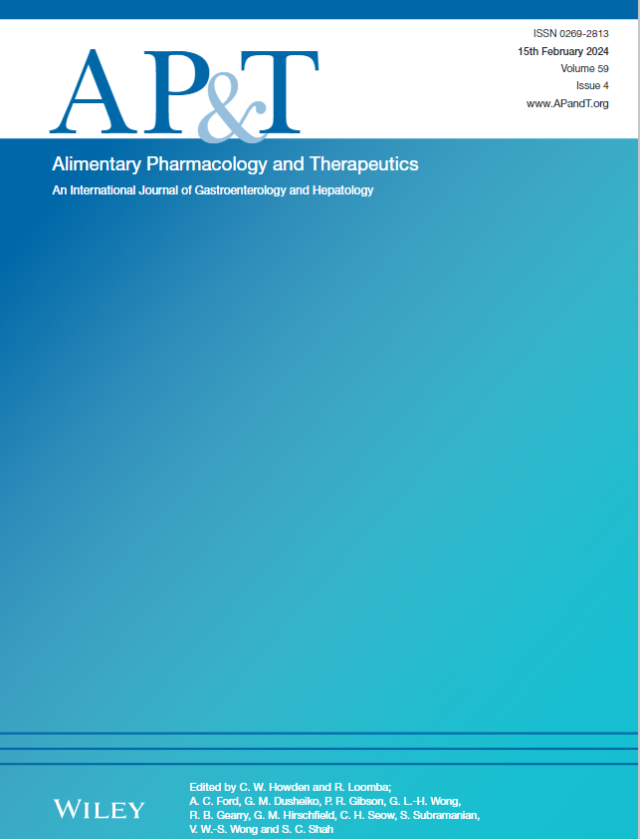荟萃分析:脂肪变性肝病相关遗传风险等位基因对纵向结局的影响
IF 6.6
1区 医学
Q1 GASTROENTEROLOGY & HEPATOLOGY
引用次数: 0
摘要
背景:与脂肪变性肝病(SLD)风险相关的遗传变异也可能影响临床事件。目的进行系统回顾和荟萃分析,以确定SLD相关遗传变异对SLD肝脏和肝外并发症的影响。方法:我们检索了PubMed、Embase和Medline数据库,从成立到2024年7月4日,检索了关于成人SLD的研究,这些研究报告了PNPLA3、TM6SF2、MBOAT7、HSD17B13和GCKR变异对肝硬化、主要不良肝脏结局(MALO)、心血管疾病、肝外恶性肿瘤和总体或原因特异性死亡率的影响。我们汇总了这些结果的风险比和95%置信区间,以便进行比较。结果我们筛选了6475项研究,最终分析了40项。PNPLA3‐rs738409‐GG基因型(与CC基因型相比)与MALO发生率(sHR 2.30 [95% CI 1.66-3.18])、肝脏相关死亡率(sHR 2.83 [95% CI 1.58-5.06])和全因死亡率(HR 1.24 [95% CI 1.04-1.47])显著升高相关。TM6SF2‐rs58542926‐CT或TT(相对于CC)基因型与较高的肝细胞癌发病率相关(sHR为2.12 [95% CI 1.66-2.70])。MALO与MBOAT7‐rs641738‐TT基因型(vs. CC)显著相关(sHR为1.21 [95% CI为1.1-1.33])。文献的局限性包括不一致的结果报告和纤维化阶段的分布,以及酒精相关肝脏疾病和非PNPLA3遗传变异的研究相对缺乏。结论PNPLA3、TM6SF2和MBOAT7的变异与肝脏预后显著相关,特别是与晚期基线肝病相关,对肝外预后影响不大。常规基因分型可改善SLD合并晚期肝病患者的风险分层。本文章由计算机程序翻译,如有差异,请以英文原文为准。
Meta‐Analysis: Effects of Steatotic Liver Disease‐Associated Genetic Risk Alleles on Longitudinal Outcomes
BackgroundGenetic variants associated with risk of steatotic liver disease (SLD) may also influence clinical events.AimsTo perform a systematic review and meta‐analysis to determine the impact of SLD‐associated genetic variants on hepatic and extrahepatic complications in SLD.MethodsWe searched PubMed, Embase and Medline databases from inception through July 4th, 2024 for studies on adults with SLD that reported effects of PNPLA3 , TM6SF2 , MBOAT7 , HSD17B13 and GCKR variants on the incidence of cirrhosis, major adverse liver outcomes (MALO), cardiovascular disease, extrahepatic malignancy and overall or cause‐specific mortality. We pooled hazard ratios and 95% confidence intervals from these outcomes to allow for comparison.ResultsWe screened 6475 studies and included 40 in the final analysis. PNPLA3 ‐rs738409‐GG genotype (vs. CC genotype) was associated with significantly higher incidence of MALO (sHR 2.30 [95% CI 1.66–3.18]), liver‐related mortality (sHR 2.83 [95% CI 1.58–5.06]) and all‐cause mortality (HR 1.24 [95% CI 1.04–1.47]). TM6SF2 ‐rs58542926‐CT or TT (vs. CC) genotype was associated with a higher incidence of hepatocellular carcinoma (sHR 2.12 [95% CI 1.66–2.70]). MALO was significantly associated with MBOAT7 ‐rs641738‐TT (vs. CC) genotype (sHR 1.21 [95% CI 1.1–1.33]). Limitations in the literature include inconsistent outcome reporting and distribution of fibrosis stage, and a relative paucity of studies on both alcohol‐associated liver disease and non‐PNPLA3 genetic variants.ConclusionsVariants in PNPLA3 , TM6SF2 and MBOAT7 are significantly associated with hepatic outcomes, especially with advanced baseline liver disease, with modest effects on extrahepatic outcomes. Routine genotyping may improve risk stratification in SLD patients with advanced liver disease.
求助全文
通过发布文献求助,成功后即可免费获取论文全文。
去求助
来源期刊
CiteScore
15.60
自引率
7.90%
发文量
527
审稿时长
3-6 weeks
期刊介绍:
Alimentary Pharmacology & Therapeutics is a global pharmacology journal focused on the impact of drugs on the human gastrointestinal and hepato-biliary systems. It covers a diverse range of topics, often with immediate clinical relevance to its readership.

 求助内容:
求助内容: 应助结果提醒方式:
应助结果提醒方式:


